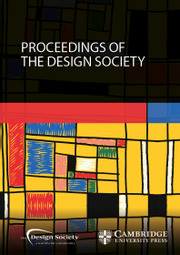Article contents
ROBUST MULTI-OBJECTIVE OPTIMIZATION IN PRODUCT DEVELOPMENT WITH RESPECT TO USER-SCENARIO AND MANUFACTURING UNCERTAINTIES
Published online by Cambridge University Press: 27 July 2021
Abstract
In product development, user-scenarios are a way of tailoring requirements to defined customer groups. Furthermore, a product design often involves multiple conflicting objectives that are analyzed within an iterative process. The models typically used for the analysis often do not accurately reflect the real-world representation. This can be alleviated by finding robust product designs. While usually uncertainties due to manufacturing tolerances are investigated, we additionally consider uncertainties in the user-scenario. Therefore, we present a robustness evaluation in a multi-objective numerical optimization in product development. For this, we consider manufacturing tolerances using an adjusted Latin Hypercube Sampling as well as deviations in the user-scenario by means of a Gaussian distribution. In the case study, we present the robust development of a customer specific coffee machine, where we show the robustness evaluation and the impact of the proposed adjustments. The advantage of the presented process is a product design tailored to the customer's requirements under specified uncertainties. In addition, this enables a time benefit in the product development due to the automated analysis used in the optimization.
Keywords
Information
- Type
- Article
- Information
- Creative Commons
- This is an Open Access article, distributed under the terms of the Creative Commons Attribution-NonCommercial-NoDerivatives licence (http://creativecommons.org/licenses/by-nc-nd/4.0/), which permits non-commercial re-use, distribution, and reproduction in any medium, provided the original work is unaltered and is properly cited. The written permission of Cambridge University Press must be obtained for commercial re-use or in order to create a derivative work.
- Copyright
- The Author(s), 2021. Published by Cambridge University Press
References
REFERENCES
- 1
- Cited by

